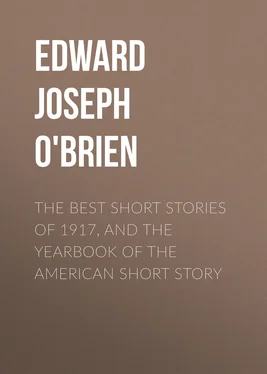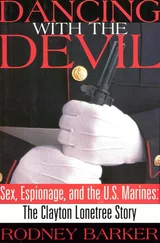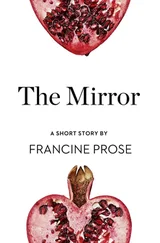Edward O'Brien - The Best Short Stories of 1917, and the Yearbook of the American Short Story
Здесь есть возможность читать онлайн «Edward O'Brien - The Best Short Stories of 1917, and the Yearbook of the American Short Story» — ознакомительный отрывок электронной книги совершенно бесплатно, а после прочтения отрывка купить полную версию. В некоторых случаях можно слушать аудио, скачать через торрент в формате fb2 и присутствует краткое содержание. Издательство: Иностранный паблик, Жанр: foreign_prose, literature_20, foreign_antique, на английском языке. Описание произведения, (предисловие) а так же отзывы посетителей доступны на портале библиотеки ЛибКат.
- Название:The Best Short Stories of 1917, and the Yearbook of the American Short Story
- Автор:
- Издательство:Иностранный паблик
- Жанр:
- Год:неизвестен
- ISBN:нет данных
- Рейтинг книги:3 / 5. Голосов: 1
-
Избранное:Добавить в избранное
- Отзывы:
-
Ваша оценка:
- 60
- 1
- 2
- 3
- 4
- 5
The Best Short Stories of 1917, and the Yearbook of the American Short Story: краткое содержание, описание и аннотация
Предлагаем к чтению аннотацию, описание, краткое содержание или предисловие (зависит от того, что написал сам автор книги «The Best Short Stories of 1917, and the Yearbook of the American Short Story»). Если вы не нашли необходимую информацию о книге — напишите в комментариях, мы постараемся отыскать её.
The Best Short Stories of 1917, and the Yearbook of the American Short Story — читать онлайн ознакомительный отрывок
Ниже представлен текст книги, разбитый по страницам. Система сохранения места последней прочитанной страницы, позволяет с удобством читать онлайн бесплатно книгу «The Best Short Stories of 1917, and the Yearbook of the American Short Story», без необходимости каждый раз заново искать на чём Вы остановились. Поставьте закладку, и сможете в любой момент перейти на страницу, на которой закончили чтение.
Интервал:
Закладка:
This delay, however, was nowise to be blamed upon the tardiness of the newspapers; it was occasioned by the fact that the person referred to was for the moment well out of contact with the active currents of world affairs, he being confined in a workhouse at Evansville, Indiana.
As soon as he had rallied from the shock this individual set about making plans to put himself in direct touch with the inheritor. He had ample time in which to frame and shape his campaign, inasmuch as there remained for him yet to serve nearly eight long and painfully tedious weeks of a three-months' vagrancy sentence. Unlike most of those now manifesting their interest, he did not write a letter; but he dreamed dreams that made him forget the annoyances of a ball and chain fast on his ankle and piles of stubborn stones to be cracked up into fine bits with a heavy hammer.
We are getting ahead of our narrative, though—days ahead of it. The chronological sequence of events properly dates from the morning following the morning when Peep O'Day, having been abruptly translated from the masses of the penniless to the classes of the wealthy, had forthwith embarked upon the gastronomic orgy so graphically detailed by Deputy Sheriff Quarles.
On that next day more eyes probably than had been trained in Peep O'Day's direction in all the unremarked and unremarkable days of his life put together were focused upon him. Persons who theretofore had regarded his existence—if indeed they gave it a thought—as one of the utterly trivial and inconsequential incidents of the cosmic scheme, were moved to speak to him, to clasp his hand, and, in numerous instances, to express a hearty satisfaction over his altered circumstances. To all these, whether they were moved by mere neighborly good will, or perchance were inspired by impulses of selfishness, the old man exhibited a mien of aloofness and embarrassment.
This diffidence or this suspicion—or this whatever it was—protected him from those who might entertain covetous and ulterior designs upon his inheritance even better than though he had been brusque and rude; while those who sought to question him regarding his plans for the future drew from him only mumbled and evasive replies, which left them as deeply in the dark as they had been before. Altogether, in his intercourse with adults he appeared shy and very ill at ease.
It was noted, though, that early in the forenoon he attached to him perhaps half a dozen urchins, of whom the oldest could scarcely have been more than twelve or thirteen years of age; and that these youngsters remained his companions throughout the day. Likewise the events of that day were such as to confirm a majority of the observers in practically the same belief that had been voiced of Mr. Quarles—namely, that whatever scanty brains Peep O'Day might have ever had were now completely addled by the stroke of luck that had befallen him.
In fairness to all—to O'Day and to the town critics who sat in judgment upon his behavior—it should be stated that his conduct at the very outset was not entirely devoid of evidences of sanity. With his troupe of ragged juveniles trailing behind him, he first visited Felsburg Brothers' Emporium to exchange his old and disreputable costume for a wardrobe that, in accordance with Judge Priest's recommendation, he had ordered on the afternoon previous, and which had since been undergoing certain necessary alterations.
With his meager frame incased in new black woolens, and wearing, as an incongruous added touch, the most brilliant of neckties, a necktie of the shade of a pomegranate blossom, he presently issued from Felsburg Brothers' and entered M. Biederman's shoe store, two doors below. Here Mr. Biederman fitted him with shoes, and in addition noted down a further order, which the purchaser did not give until after he had conferred earnestly with the members of his youthful entourage.
Those watching this scene from a distance saw—and perhaps marveled at the sight—that already, between these small boys, on the one part, and this old man, on the other, a perfect understanding appeared to have been established.
After leaving Biederman's, and tagged by his small escorts, O'Day went straight to the courthouse and, upon knocking at the door, was admitted to Judge Priest's private chambers, the boys meantime waiting outside in the hall. When he came forth he showed them something he held in his hand and told them something; whereupon all of them burst into excited and joyous whoops.
It was at that point that O'Day, by the common verdict of most grown-up onlookers, began to betray the vagaries of a disordered intellect. Not that his reason had not been under suspicion already, as a result of his freakish excess in the matter of B. Weil & Son's wares on the preceding day; but the relapse that now followed, as nearly everybody agreed, was even more pronounced, even more symptomatic than the earlier attack of aberration.
In brief, this was what happened: To begin with, Mr. Virgil Overall, who dealt in lands and houses and sold insurance of all the commoner varieties on the side, had stalked O'Day to this point and was lying in wait for him as he came out of the courthouse into the Public Square, being anxious to describe to him some especially desirable bargains, in both improved and unimproved realty; also, Mr. Overall was prepared to book him for life, accident and health policies on the spot.
So pleased was Mr. Overall at having distanced his professional rivals in the hunt that he dribbled at the mouth. But the warmth of his disappointment and indignation dried up the salivary founts instantly when the prospective patron declined to listen to him at all and, breaking free from Mr. Overall's detaining clasp, hurried on into Legal Row, with his small convoys trotting along ahead and alongside him.
At the door of the Blue Goose Saloon and Short Order Restaurant its proprietor, by name Link Iserman, was lurking, as it were, in ambush. He hailed the approaching O'Day most cordially; he inquired in a warm voice regarding O'Day's health; and then, with a rare burst of generosity, he invited, nay urged, O'Day to step inside and have something on the house—wines, ales, liquors or cigars; it was all one to Mr. Iserman. The other merely shook his head and, without a word of thanks for the offer, passed on as though bent upon a important mission.
Mark how the proofs were accumulating: The man had disdained the company of men of approximately his own age or thereabout; he had refused an opportunity to partake of refreshment suitable to his years; and now he stepped into the Bon Ton toy store and bought for cash—most inconceivable of acquisitions!—a little wagon that was painted bright red and bore on its sides in curlicued letters, the name Comet.
His next stop was made at Bishop & Bryan's grocery, where, with the aid of his youthful compatriots, he first discriminatingly selected, and then purchased on credit, and finally loaded into the wagon, such purchases as a dozen bottles of soda pop, assorted flavors; cheese, crackers—soda and animal; sponge cakes with weather-proof pink icing on them; fruits of the season; cove oysters; a bottle of pepper sauce; and a quantity of the extra large sized bright green cucumber pickles known to the trade as the Fancy Jumbo Brand, Prime Selected.
Presently the astounding spectacle was presented of two small boys, with string bridles on their arms, drawing the wagon through our town and out of it into the country, with Peep O'Day in the rôle of teamster walking alongside the laden wagon. He was holding the lines in his hands and shouting orders at his team, who showed a colty inclination to shy at objects, to kick up their heels without provocation, and at intervals to try to run away. Eight or ten small boys—for by now the troupe had grown in number and in volume of noise—trailed along, keeping step with their elderly patron and advising him shrilly regarding the management of his refractory span.
Читать дальшеИнтервал:
Закладка:
Похожие книги на «The Best Short Stories of 1917, and the Yearbook of the American Short Story»
Представляем Вашему вниманию похожие книги на «The Best Short Stories of 1917, and the Yearbook of the American Short Story» списком для выбора. Мы отобрали схожую по названию и смыслу литературу в надежде предоставить читателям больше вариантов отыскать новые, интересные, ещё непрочитанные произведения.
Обсуждение, отзывы о книге «The Best Short Stories of 1917, and the Yearbook of the American Short Story» и просто собственные мнения читателей. Оставьте ваши комментарии, напишите, что Вы думаете о произведении, его смысле или главных героях. Укажите что конкретно понравилось, а что нет, и почему Вы так считаете.












